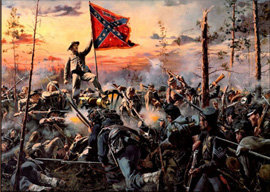
June 03, 2011

Northern citizens knew which side of their bread was dripping with Dixie butter. On December 10, 1860, the Chicago Daily Times wrote of secession’s potential economic impact:
In one single blow, our foreign commerce must be reduced to less than one-half of what it is now. Our coastwise trade would pass into other hands. One-half of our shipping would lie idle at our wharves. We should lose our trade with the South, with all of its immense profits. Our manufacturers would be in utter ruins.
Money, the root of all of evils, was also the root of US history’s deadliest war. Slavery had little to do with either side’s hurt feelings.
But beyond the tariff war, the Southerners had an even bigger gripe: They despised Lincoln. His Republican party was strictly a Northern invention, founded only a few years before Sumter in 1854, and his election meant that Southern issues would be ignored for four years. In truth, they had no idea how bad a president old Abe would be. The “Great Emancipator” showed how much he respected liberty when he suspended habeas corpus rights a month into the conflict and declared martial law. Not only did Lincoln hijack Southern citizens’ right to govern themselves, he now sought to expand his executive power at the expense of his citizens’ civil rights. Americans are surprisingly willing, both then and now, to hand over their liberties without demanding proof when the state claims the country is under threat.
Lincoln had no beef with slavery. This is the same guy who said:
I have no purpose, directly or indirectly, to interfere with the institution of slavery where it exists. I believe I have no lawful right to do so, and I have no inclination to do so….If I could save the Union without freeing any slave I would do it….What I do about slavery, and the colored race, I do because I believe it helps to save the Union; and what I forbear, I forbear because I do not believe it would help to save the Union.
He wanted a strong, centralized government that ruled over the weakened states with as much power as he could seize. Though he never lived to see fascism or communism, Lincoln clearly understood the role of dictator.
Even after Lincoln’s death, and for twelve years after the war had ended, Reconstruction further proved that the fighting had little to do with slavery. If the North cared primarily about freeing slaves, soldiers would have vacated the South shortly after Lee’s surrender. Instead, there was nation-building in Dixie. Anyone connected to the previous regime or military (essentially all Southern males) could no longer vote, run for office, or exercise any of their constitutional rights without pledging support for the Union. A Southerner was forced to surrender his dignity and vow allegiance to the conquerors who had ravaged his people and his land. Southerners had their right to a representative government suspended indefinitely, their dignity trampled, and over a quarter million of their citizens killed by foreign invaders from the North, then were forced to suck it all up and like it. Not surprisingly, the vanquished South held onto its anger for generations after Appomattox. Even now, in the modern, post-industrial South, being called a Yankee is no compliment. And it has little to do with the Emancipation Proclamation.
It’s comforting to think that the crux of the conflict was slavery and that the war was a victory for all Americans, but that theory isn’t rooted in reality. Still, teachers continue to spoon-feed their students this nonsense for the same reason they often show movies in class: It keeps the kids entertained, in their seats, and it prevents curious minds from asking difficult questions that could cause trouble with parents, principals, or school boards. (I taught at a public high school for a year and breathe audible sighs of relief every day that I’m free of that job. Teenagers are gruesome, volatile creatures, much like feral dogs in heat. And my fellow educators in the faculty room were even worse. It was hardly a good recipe for serious education.)
Though history is written and rewritten by the victors, and is therefore a load of self-aggrandizing crap, it behooves us to examine our actions and learn from our myriad mistakes. Self-reflection is never fun and the huddled masses typically prefer propaganda to unbiased representations, but our refusal to acknowledge that the Southern states had a multitude of legitimate gripes against the Union is as blind as believing that instability and oppression in Libya were threats to US interests: It may sound pretty but has no basis in fact.